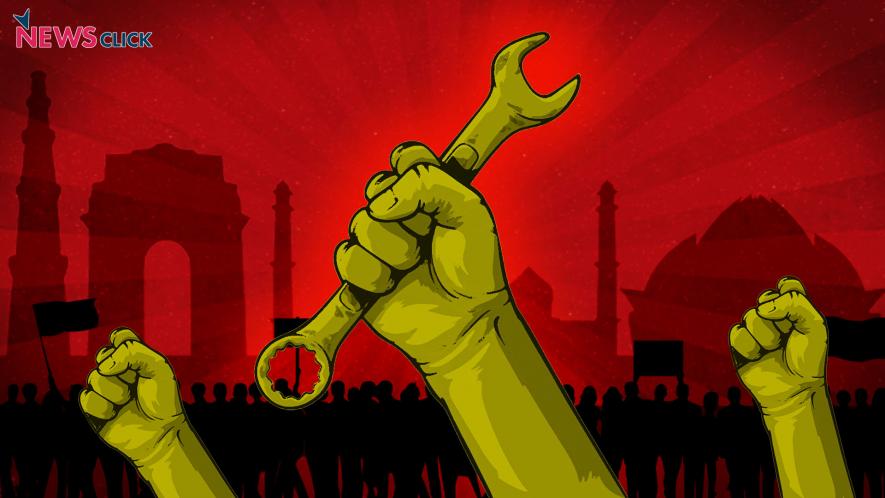Delhi: Over 2 Million Workers to Strike on 20 July

Amidst the news-hogging war between the BJP led Central govt. and the AAP led state govt, a third marginalised but potentially powerful force is flexing its muscles in India’s National Capital Region. At the call of 11 trade unions, over 2 million workers and employees are planning to go on a one-day strike on 20 July. It is after nearly a decade that industrial workers in the capital will strike work on their demands, in a bid to improve fast deteriorating living and working conditions.
There are nearly 3 lakh micro, small and medium enterprises in Delhi and about 9000 registered factories as per official records. But a vast number of industrial units function without any authorisation employing many lakhs more. Recent incidents of fire outbreaks exposed the tragedy of workers in such illegal units. In this year alone there have been seven such fires taking a toll of 28 workers.
Delhi is a very expensive city where transport, rent, school charges, healthcare etc. take out a huge chunk of a workers’ earnings. Since most are migrants from distant villages, another portion of their earnings goes back to families in villages. Most workers stay in slums with minimal civic amenities. Working conditions are highly oppressive with 10-12 hours working days, lack of leaves, and no job security.
The key issue for the workers is implementation of officially declared minimum wage of Rs.13,896 per month. The AAP govt. led by chief minister Arvind Kejriwal had notified this new level back in March 2017. But various industry and trade bodies filed a petition in the Delhi High Court challenging the 37% hike claiming that it was unbearable and would destroy the viability of their units.
Bizarrely, although the Court did not grant any injunction staying the wage notification, the AAP govt. has kept the implementation in abeyance even as it defended the hike in the court. Hearings ended in December, the court reserved its order, reopened the case, and finally closed hearings on 23 May 2018. Till date no order has been issued. Meanwhile the state govt. continues to hold the hike in abeyance.
“Actually, by govt. norms Delhi workers should get at least Rs.20,000 monthly wage,” explained Anurag Saxena, general secretary of the Delhi unit of Centre of Indian Trade Unions (CITU) who is also member of the Minimum Wage Board for Delhi. “But we are fighting just to get the govt.’s own announcement implemented.”
Not more than 5% of Delhi’s employers have implemented the revised scales, according to Saxena. The AAP govt. has effectively surrendered before the industrialist lobby even though it claims to be pro-poor and people oriented, he added.
Unsurprisingly, BMS, the trade union linked to the BJP which rules at the Centre, is not part of the joint front that has called for the strike. Not only does it want to demarcate itself from the other unions but in general it underplays strike actions and pushes for so-called harmonious relations between labour and capital. Even its bitter political opposition to AAP has not forced it to change its allegiance to the industrialist lobby.
The workers are also demanding that the Labour Department of Capital be rejuvenated and made more effective. There are only 11 labour inspectors (against 72 sanctioned posts) while there are only four factory inspectors. It is impossible for them to deal with the sprawling metropolis’ industrial units. This situation has been deliberately created to allow wholesale violation of labour laws, says Saxena.
Other demands raised by the joint front of trade unions include the end to wide-spread out-contracting system that has permeated even the govt.’s own functions. According to Saxena, 50-60% of employees of the Delhi govt. are now under contractual system with no job security, limited benefits and low wages. They are also agitated over non-implementation of the scales recommended by the 7thPay Commission in 2015.
Construction workers, that are estimated to number some 6-7 lakh in the region, too have gotten a raw deal. Over Rs.2600 crore collected as cess from builders and developers for benefits like schools for construction labourers’ children lies unutilised alleged Saxena.
Other demands include equal pay and facilities for women workers, regularisation of anganwadi workers, ASHA/USHAs, settlement of demands of Delhi Metro workers, improve functioning of Labour Dept., etc.
Get the latest reports & analysis with people's perspective on Protests, movements & deep analytical videos, discussions of the current affairs in your Telegram app. Subscribe to NewsClick's Telegram channel & get Real-Time updates on stories, as they get published on our website.























